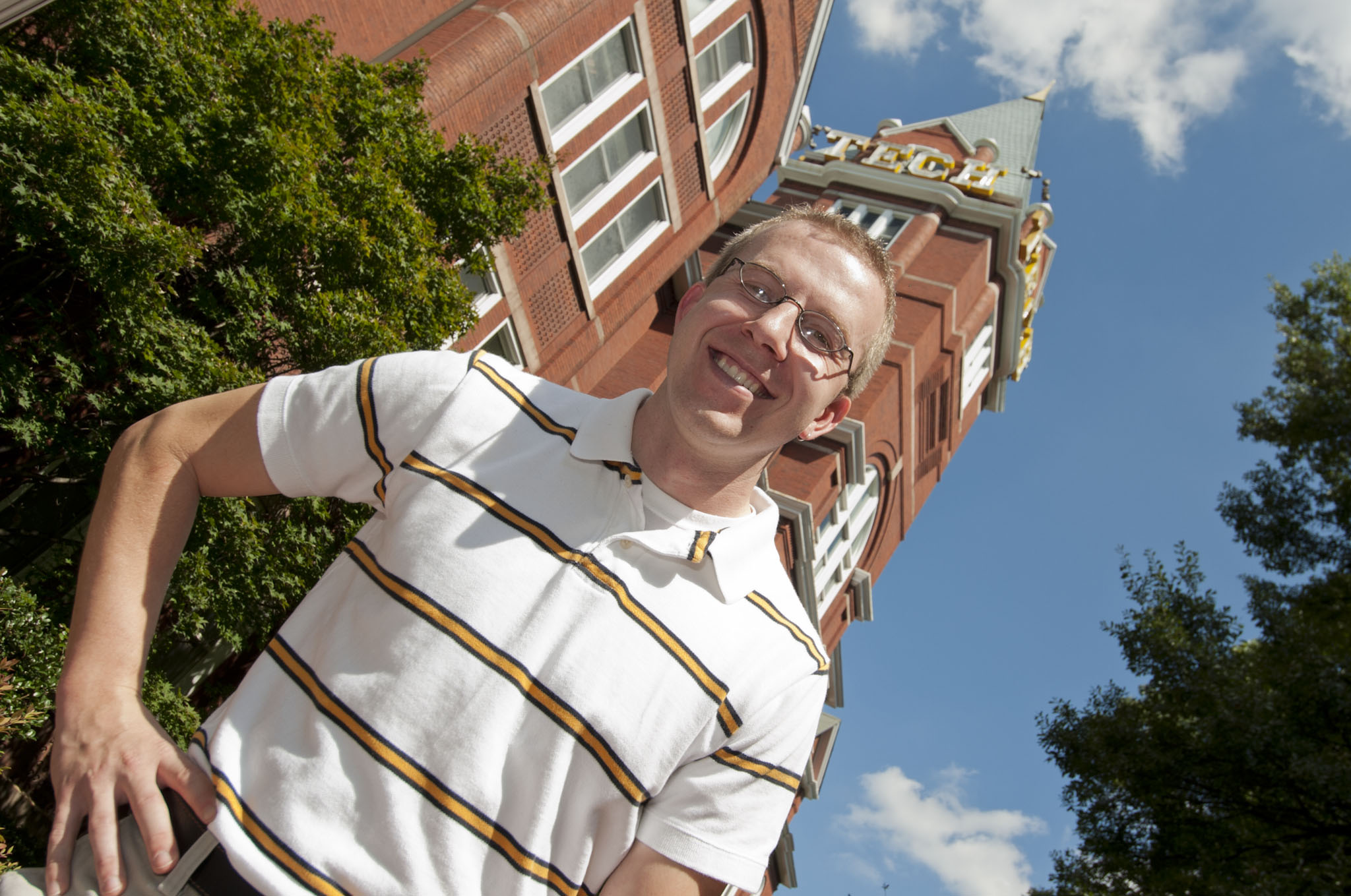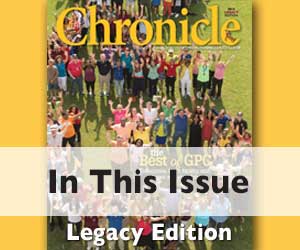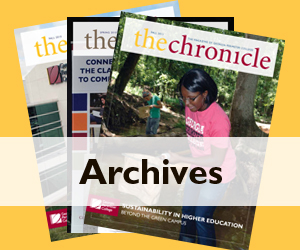
Kavya Manyapu, an alumna of Georgia Tech and Massachusetts Institute of Technology, says Georgia Perimeter College gave her a strong start to reach her dream. (Photo courtesy of Kavya Manyapu)
GPC Lays Foundation for Demanding Degrees and Industries
By Rebecca Rakoczy
Say “engineering” and Georgia Tech’s name soon emerges. As a top 10 school in the nation, the institution produces more than 2,400 aerospace, biomedical, civil, electrical and mechanical engineers each year.
What is less often heard is that dozens of these students began their college career at Georgia Perimeter College, gaining the credits—and the knowledge—to tackle Georgia Tech’s demanding engineering curriculum.
Dr. Felicia Benton Johnson, who oversees Georgia Tech’s transfer program, says GPC is one of the University System of

GPC engineering professor Anant Honkan helps student John Allen with project. (Photo by Bill Roa)
Georgia’s largest providers of transfer students to the engineering school. And the students perform well once they arrive.
Since 2000, when Georgia Tech began tracking transfers to its engineering program, GPC students’ success at Tech has been stellar, with about 93 percent of them completing their engineering degrees.
GPC’s Dr. Anant Honkan beams like a proud father about his students’ success at Georgia Tech. The engineering professor, who directs Georgia Perimeter’s Regents Engineering Transfer Program, has shepherded hundreds of students over the years in their successful transfers to Tech’s engineering school. Honkan is part of a collegewide team of engineering, physics, computer science and mathematics professors who make sure students are ready for transfer.
“Typically our enrollment in GPC’s engineering program is almost 400 students a year, and 80 percent of them want to transfer to Tech,” Honkan says. Others choose to go to Southern Polytechnic State University in Marietta or other institutions.
“These students have varied life experiences,” says Honkan, who gets to know those in his program and classes and understands their challenges and their dreams. “Many are what I call nonconventional students who are extremely motivated.”
Here’s a small sampling of their stories.
“I want to go to the moon someday.”

GPC alumna Kavya Manyapu is a flight test engineer at The Boeing Company. (Photo courtesy of Elizabeth H. Morrell, The Boeing Company)
Growing up in India, Kavya Manyapu had a special fascination for the night sky.
“I am very close to my dad; I remember when I was young we would go upstairs to the roof and look at the moon and stars, and he would share stories about the moon and science,” she recalls. “My dad talked about humans stepping on the moon. At the time, I never knew the term ‘astronaut,’ but I knew I wanted to go to the moon someday.”
These days, Manyapu is actively pursuing her dream. She is a flight test engineer at The Boeing Company, working on the NASA Commercial Crew program for the CST-100, one of the spacecraft slated to replace NASA’s space shuttle to the International Space Station.
With the dismantling of the shuttle program, Russia is now the only country shuttling astronauts to the space station, but commercial ventures such as Boeing’s seek to remedy that.
Manyapu holds a bachelor’s degree in aerospace engineering from Georgia Tech and a master’s degree in aeronautics and astronautics from the Massachusetts Institute of Technology. But she has never forgotten that she started on her career path at Georgia Perimeter College.
“Professor Anant Honkan was one my best professors,” she recalls. “He gave me much encouragement to pursue my dreams.”
Manyapu said her Georgia Perimeter professors provided more attention to individual students, “especially in Dr. Honkan’s class. He made sure everybody understood the concepts. He also introduced me to people who worked at NASA and was instrumental in helping me with my career aspirations.”
In her current role at Boeing, Manyapu works as flight test engineer on the commercial space, focusing on tests that ensure safe exit strategies for astronauts in the event of an emergency on the STS-100. She also has contributed to the design and development of the spacecraft’s cockpit display and conducted evaluations on its usability.
Manyapu’s work ethic and her enthusiasm are inspiring to other engineers, says Paula Korn, a spokesperson for Boeing.
“Kavya is what we call part of the ‘Boeing Six,’” says Korn. “These are six young engineers who are working in the commercial crew program, and they are very articulate and very inspiring. They set an example for others. There is so much energy and excitement in what they do.”
The Boeing team was excited when Manyapu was selected as a member of the Mars Society expedition on a simulated Mars “habitat” in the desert last year. Her crew’s assignment was to develop and test technologies for a human Mars exploration.
“I learned what it was like to live like an astronaut on Mars, with minimal help from ‘mission control,’” she says. “It was a good eye-opener on what it is like to be an astronaut.”
Manyapu also volunteers as a mentor to high school students as part of a program called NASA Aerospace Scholars.
“I want to inspire the next generation,” she says. “I think the biggest message I give is one I received over the years—that of perseverance. If you believe and you have a passion for something, you should definitely go for it. Just try hard, and if you put in your best, that’s going to take you far.”
Flexibility makes study easier

Oscar Perero works at a door systems company. (Photo by Bill Roa)
Open a door and close it. For many, that action requires no special thought. But if you’re
Oscar Perero, the mechanics behind that door—the hinges, the slides, the seals—hold a special fascination.
Figuring out how things work and creating better designs for parts is what drew Perero, who works at a door systems company, to go to a technical school to learn about mechanical drafting. Soon after starting, however, Perero knew he wanted to expand his dream from drafting to mechanical engineering, so he enrolled at Georgia Perimeter.
“I wanted to know the physics behind the mechanics,” he says.
Once at GPC, he learned about the RETP program. “I have always liked math and physics, and I was always interested in understanding the physical properties behind the production of gears and stuff,” he says. “I learned that RETP was an easier way to get into Georgia Tech: if you finish all the requirements, you are guaranteed to go to Tech.”
“Easier” may be a misnomer in some eyes. All RETP students must complete two years of rigorous study in mathematics, computer science and engineering, as well as pass English and social science courses before they are eligible for transfer. They also must have a GPA of at least 3.0 in their core subjects of study.
For students like Perero, GPC offers something else that most schools don’t—an accessible schedule. “I work, and one of the things I like so much about GPC is that it’s very flexible,” Perero says. “I am able to manage my time in school and at work.”
Since he enrolled in the engineering program at GPC, Perero has been allowed to work in his company’s engineering department once a week.
Perero will complete his RETP program this December. He plans to transfer to Georgia Tech in January and pursue his degree in mechanical engineering.
From accountant to aerospace engineer

Kyle Jewett is pursuing an aerospace engineering degree. (Photo by Bill Roa)
When Kyle Jewett was laid off as an auditor for an accounting firm, the 25-year-old took stock of his life. “I thought, I can try [to] interview for another job that I wasn’t really happy in, or I can really do something different, something I really love.”
That love was space.
Jewett decided to go back to school to pursue an aerospace engineering degree. He first came to Georgia Perimeter College and enrolled in the engineering program.
“I was 25 when I came to Perimeter, and I really felt like the teachers there prepared me for Georgia Tech,” Jewett says. “In many ways, I feel like I was better prepared than some of the students who came straight to Tech. GPC’s small class sizes gave me a lot of instructor interaction, which really helped me adjust to being back in school. I definitely had a great experience at GPC.”
Jewett received a Boeing scholarship at Georgia Tech, where he is an aerospace engineering honors student. He plans to graduate in May and continue his graduate studies at Tech.
Studying to be an aerospace engineer has inspired him to think of the future.
“I believe humanity needs to expand as a whole to space travel though collaboration, not one country pitted against each other,” he says. “I want to be on that team that takes it to the next level. By the end of my career, I want to be able to say that my own work directly had something to do with putting the first footprints on Mars.”
Designs to change the world

Brendon Mack is interested in ‘green’ design. (Photo by Bill Roa)
Brendon Mack loves the idea of creating and designing something that is both functional and artistic. But he also wants to design something that is “green.”
“I want to make something that will change the world—something that involves green development,” the Lawrenceville sophomore says. “We use four recycling bins and just one trash bag for our family each week, and we’ve always stressed being as green as possible.”
The 20-year-old learned about Georgia Perimeter’s RETP program while taking a Physics 1211 course with GPC professor Martin Okafor. “I met some of the students in the MESA [Mathematics, Engineering, Science Achievement Program] lab and studied with them, and right across the hallway was Dr. Honkan,” he says.
Mack has completed several of his requirements and hopes to transfer to Georgia Tech next fall, where he will study civil engineering and perhaps pursue a degree in architecture as well.
The Peachtree Ridge High School graduate, who works as a short order cook when not attending classes, considered other colleges, one of them closer to home. “I looked at their transfer program, and it didn’t match GPC’s,” he says. “It’s worth the drive.”
A change of life and a new beginning
When Russell Davis was in high school, he didn’t aim high.

Russell Davis is pursuing a mechanical engineering degree. (Photo by Bill Roa)
“I was not the best of students,” he says. “But I came from a family that was primarily small business owners and entrepreneurs, and I didn’t see a necessity to worry much about a college education—there were plenty of people doing blue collar or vocational-type jobs and making good money at it. A middle-class standard of living was still within reach for anyone willing to get out there and use his hands or learn a skill.”
So instead of pursuing his college degree, Davis joined the United States Marines. When he came home four years later, he worked for the Internal Revenue Service, first as a clerk and then as a computer operator—before the days of personal computers. Then “life happened,” he says. He married, started a family and moved to other jobs.
Fast forward to 2010 when he found himself, at “50-something,” seeking employment in a declining job market.
After applying for hundreds of positions and being told he did not qualify, Davis decided to go back to school. He learned about Georgia Perimeter’s RETP while visiting Georgia Tech. “Within the next few days, I met with Professor Honkan, who guided me through the admissions process and enabled me to start classes at GPC in spring of 2011.”
Davis is pursuing a mechanical engineering degree.
“I have to say this has been one of the greatest experiences in my life,” he says. “The people I’ve met here, the feeling of success and accomplishment that has given me a sense of purpose, the hope for a brighter future—all this has been made possible by daring to put all those doubts aside for a scant few moments one evening and dream what could be.”
Find out more about GPC’s Engineering program and RETP.







Emily Whaley on November 29, 2012 at 5:11 pm.
Impressive! Thank you for showcasing the academic excellence of a two-year school.
Dean Ehrlich on November 29, 2012 at 5:18 pm.
GPC Engineering continues to grow because of dedicated faculty like Dr. Honkan that nurture their students and help to make their dreams a reality. Along with him are the dedicated math and science faculty that give these students the foundation and motivation to successfully complete their Engineering program. We are so proud of all of you.
Wendy on November 29, 2012 at 5:34 pm.
Nice article!! Reminds me of why I wanted to become a teacher in the first place.
Kim Bennett on November 29, 2012 at 10:26 pm.
I enjoyed reading the GPC student stories. I am also pleased to see the report that Georgia Tech and other colleges are welcoming our Engineering transfer students because our students are well-prepared and successful in their programs.
C. Lester on November 30, 2012 at 2:45 pm.
This is a very powerful article. It shows the hard work of students and faculty and how together they are making GPC’s engineering program a success. Congratulations to the students and their mentors. Keep up the good work!
Emily Cowdrick on December 5, 2012 at 10:22 am.
Excellent profile of successful GPC students!
Deevis Crawford on December 5, 2012 at 11:09 am.
GO GPC!!!!!
Feruja Zaman on January 5, 2013 at 8:47 pm.
WOW! These are some fascinating stories! I am glad GPC has been doing such a great job!
Nathaniel on January 14, 2013 at 2:33 pm.
Excellent!
Luisa Giler Mejia on August 24, 2013 at 9:31 pm.
This article is great because of Oscar Perero is my husband!!!